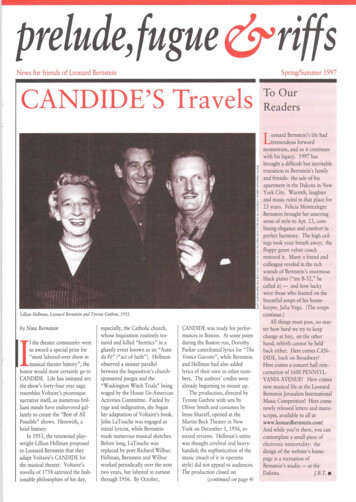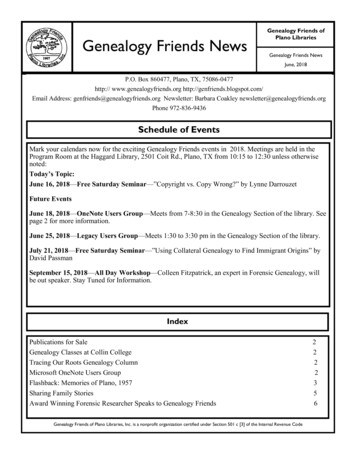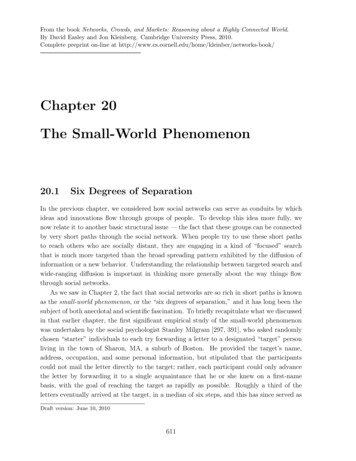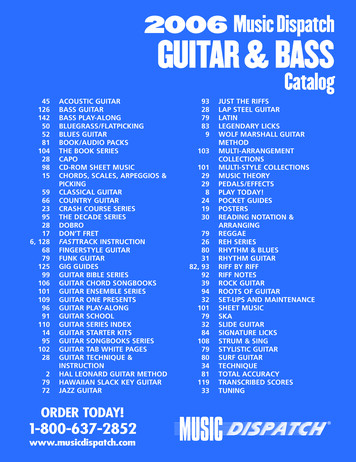
Transcription
rt sNews for friends of Leonard BernsteinSpring/Summer 1997CANDIDE'S TravelsTo OurReaderseonard Bernstein's life hadtremendous forwardmomentum, and so it continueswlth his legacy. 1997 hasbrought a difficult but inevitabletransition to Bernstein's familyand friends: the sale of hisapartment in the Dakota in NewYork City. Warmth, laughterand music ruled in that place for23 years. Felicia MontealegreBernstein brought her unerringsense of style to Apt. 23, combining elegance and comfort inperfect harmony. The high ceilings took your breath away; thefloppy green velvet couchrestored it. Many a friend andcolleague reveled in the richsounds of Bernstein's enormousblack piano ("my B-52," hecalled it) - and how luckywere those who feasted on thebeautiful soups of his housekeeper, Julia Vega. (The soupscontinue.)All things must pass, no matter how hard we try to keepchange at bay; on the otherhand, rebirth cannot be heldback either. Here comes CANDIDE, back on Broadway!Here comes a concert hall reincarnation of 1600 PENNSYLVANIA AVENUE! Here comesnew musical life at the LeonardBernstein Jerusalem InternationalMusic Competition! Here comenewly released letters and manuscripts, available to all atwww .leonardbernstein.com !And while you're there, you cancontemplate a small piece ofelectronic immortality: thedesign of the website's homepage is a recreation ofBernstein's studio - at theDakota.J.B. T. LLillian Hellman, Leonard Bernstein and Tyrone Guthrie, 1955.by Nina Bernsteinf the theater community wereto award a special prize for"most labored-over show inmusical theater history", thehonor would most certainly go toCANDIDE. Life has imitated art:the show's forty-four year sagaresembles Voltaire's picaresquenarrative itself, as numerous brilliant minds have endeavored ga llantly to create the "Best of AllPossible" shows. Herewith, abrief history:In 1953, the renowned playwright Lillian Hellman proposedto Leonard Bernstein that theyadapt Voltaire's CANDIDE forthe musical theater. Voltaire'snovella of 1758 satirized the fashionable philosophies of his day,Iespecially, the Catholic church,whose Inquisition routinely tortured and killed "heretics" in aghastly event known as an "Autoda Fe" ("act of faith"). Hellmanobserved a sinister parallelbetween the Inquisition's churchsponsored purges and the"Washington Witch Trials" beingwaged by the House Un-AmericanActivities Committee. Fueled byrage and indignation, she beganher adaptation of Voltaire's book.John LaTouche was engaged asinitial lyricist, while Bernsteinmade numerous musical sketches.Before long, La Touche wasreplaced by poet Richard Wilbur.Hellman, Bernstein and Wilburworked periodically over the nexttwo years, but labored in earnestthrough 1956. By October,CANDIDE was ready for performances in Boston. At some pointduring the Bos.ton run, DorothyParker contributed lyrics for "TheVenice Gavotte", while Bernsteinand Hellman had also addedlyrics of their own to other numbers. The authors' credits werealready beginning to mount up.The production, directed byTyrone Guthrie with sets byOliver Smith and costumes byIrene Sharaff, opened at theMartin Beck Theater in NewYork on December 1, 1956, tomixed reviews. Hellman's satirewas thought cerebral and heavyhanded; the sophistication of themusic (much of it in operettastyle) did not appeal to audiences.The production closed on(continued on page 4)
The BETA FundWAM! YOUNG PEOPLE'SBETA Salutes Schuyler Chapinand the Center for Arts Education CONCERTSBETAFUNDby Alexander BernsteinThe BETA Fund is proud ofour Board Member SchuylerChapin, who, as Commissioner ofCultural Affairs for the City ofNew York, has skillfully led theeffort to make arts education onceagain a vital part of the city.Undaunted by politics, budgetbattles and bureaucracies, Mr.Chapin, along with MayorRudolph Giuliani, New York CityPublic School's Chancellor RudyCrew, as well as his wonderfulcolleagues and staff, have puttogether a public and private partnership which serves as a modelfor the nation.The Center for Arts Educationis an independent, not-for-profitorganization established inSeptember 1996 to administerand provide leadership for theNew York City Arts andEducation Initiative, supported inpart by a five-year, 12 millionchallenge grant from theAnnenburg Foundation. TheInitiative brings together theCenter for Arts Education, theNew York City Board ofEducation, the Department of2Cultural Affairs and the UnitedFederation of Teachers in aunique collaboration.In a city as large as New York,there are hundreds of culturalorganizations, community-basedorganizations, foundations andcorporations that, along with theBoard of Education, provide andsupport arts education in ourschools. The Center for ArtsEducation's role is to harnessthese efforts to improve arts education in individual schools andthe school system as a whole andassist the Board of Education toform a collective focus which willsustain itself after the initial fiveyear stage is completed.The Center for Arts Educationwill lead a concentrated effort torethink the pivotal role of arts inthe growth of our youngsters, andwill develop a broad base of support to sustain arts education inthe New York City's publicschools.On a personal note, I thank andsalute Schuyler for his level-headed, sage advice, and for his alwaysdependable support on mattersartistic and philanthropic. For more information contact:The Center for Arts Education,120 West 46th St., The JacquelineKennedy Onassis High School,Room 108, New York, NY 10036., ·-\i . --·- .·I---'"' . - . d . .fr r-Alexander Bernstein, John Sie, Chairman& CEO of Encore Media Co. and MidgePierce, VP of WAM! Programming.n February 14, in theRohatyn Room at CarnegieHall, WAM! America's KidzNetwork announced the return totelevision of LEONARD BERNSTEIN'S YOUNG PEOPLE'SCONCERTS WITH THE NEWYORK PHILHARMONICAlexander Bernstein shared thesewords at the announcement:"It never occurred to me, as Iaccompanied my father at 6:00a.m. on a Saturday to CarnegieHall or Philharmonic Hall forbleary-eyed camera rehearsals andEloise-like romps through thoseplaces which I considered my ownpersonal play-houses, runningfrom the control room in thetruck, to the stage, to the production meeting in the dressing room,to the spot-light booth way up inthe heavens behind the last seatsof the balcony - it never occuredto me that there would be a daywhen there would not beYOUNG PEOPLE'S CONCERTSon television. I think that mostviewers of these programs, whiletreasuring the experience ofwatching them, took them forgranted - much as we took musiceducation in school for granted."Now we have become all tooaware of the impoverished stateof education without music andall the arts - impoverishedbecause of budget cuts, fear andinattentiveness - and we areObeginning to see a new commitment to arts education growingall over the country. Televisionmust become part of that effort.Today I am proud and excitedthat WAM! America's Kidz Network will be broadcasting theseYOUNG PEOPLE'S CONCERTSagain. WAM! obviously has astrong commitment to the culturalgrowth of our children, and a passion for ensuring that a new generation knows the joy of music."I have had the good fortunerecently to watch videos of theseprograms with kids in classrooms.I can report, most happily, thatthe programs still enthrall, excite,inform, engage and amuse. Myfather's enthusiasm is infectious.His ability to make connectionsbetween music and other disciplines is uncanny. He never condescends, he is funny, and boy,does he know a lot! He just doesn'tsing very well at all. And eventhough some of these shows are inblack-and-white, it doesn't mattera whit to kids who watch them."So I salute WAM! heartilyfor this effort, and fondlyacknowledge the New YorkPhilharmonic - its players andmanagement, as well as RogerEnglander, who directed theseprograms, Mary Rodgers Guettel,Elizabeth "Candy" Finkler, JackGottlieb, and John Corigliano, Jr.- all of whom patiently abidedan energetic pest of a little boywho loved to hang around and bea part of it all." For channel informationplease contact the Encore MediaGroup at (303) 771-7700. TheYOUNG PEOPLE'S CONCERTS are available from TheLeonard Bernstein Society. Call(800) 382-6622, or on the internet at www.leonardbernstein.com.
Updateswww.leonardbernstein.comeactions to www.leonardbernstein.com have beenoverwhelmingly positive. Visitorsto the site have left numerouscongratulatory messages in the"Guest Book"; many say howgrateful they are for the opportunity to learn more about thisextraordinary man and his legacy.Critically, the site has been aresounding success. Excite, whichis a search engine on the WorldWide Web, awarded leonardbernstein.com a four-star ratingand recommends it as a must-see.RClassicalinsites.com, which hoststhe Bernstein website, hasreceived accolades from leadingInternet publications includingProject Cool, Infi.net, MusicSearch, The Gist, NetGuide Live,Up2Day, and Yahoo In.Bernstein's New York Philharmonic debut CD, available exclusively on the Bernstein website, isone of the top-selling discs to dateat "MusicBoulevard" (the leadingonline record store http://www.blvd.com). And thesite is still only four months old!Since the November 14, 1996launch, the site has been updatedthree times. In December, it featured the YOUNG PEOPLE'SCONCERTS, and in January, theHarvard Norton Lectures. Bothvideo series have been made available for purchase directly fromthe site. In February, it celebratedWEST SIDE STORY, and displayed production stills from theoriginal Broadway production aswell as never-before-seen lettersfrom Bernstein to his wife, Felicia,describing the final stages ofrehearsal for the landmark musical. Looking ahead, the plan isto update the site every twomonths. In April the site will feature CANDIDE in conjunctionwith the new Broadway revivalproduced by Livent Inc. In June,the site will explore Bernstein'slong and cherished associationwith the Tanglewood MusicFestival.When you visit www.leonardbernstein.com, please rememberto "sign" the Guest Book. Yourcomments, questions, and suggestions are always welcome. Leonard Bernstein JerusalemInternational Music CompetitionsMarch 1 brought registrationfor the 1997 LeonardBernstein Jerusalem InternationalComposing Competition to aclose. Applicants from 40 countries submitted 159 compositions,the largest number coming fromthe United States (40). Therewere 14 entries from Israel, 13from Italy, 10 from Russia andmany more from other countries.The theme for this year's competition is the city of Jerusalem. Theworks must be based on the HolyBooks, and/or secular poetry andliterature written in, inspired by,or otherwise connected withJerusalem. There are two categories of composition - orchestral and chamber - which mustbe 15 to 30 minutes long.After a preliminary screening,39 compositions from 17 countries have been selected for furtherconsideration. Each SponsoringInstitution will receive a copy ofthe compositions selected for thesemi-final ratings. Ten compositions will be selected to becomeFinalist Works, to be scheduledfor performance in Jerusalembeginning November 29, 1997.The composers of these workswill be invited to Jerusalem. Afterthese events, the judges appointedby the Sponsoring Institutions willaward the prize of LeonardBernstein Laureate. There is nolimit to the number of Laureatesand there is no rating. EachLaureate will receive a prize of 20,000.The Sponsoring Institutionsare Accademia Nazionale di SantaCecilia, Deutsche Grammophon,the Estate of Leonard Bernstein,Indiana University, the IsraelPhilharmonic, the JerusalemSymphony Orchestra/IBA, theLondon Symphony Orchestra, theLos Angeles Philharmonic, theNew York Philharmonic, thePacific Music Festival, RoyalConcertgebouw Orchestra, SonyClassical, the Tanglewood MusicCenter of the Boston SymphonyOrchestra, and the ViennaPhilharmonic. For more information contact:The Leonard Bernstein JerusalemInternational Music Competitions,11 Rivka St. POB 10185Jerusalem 91101 IsraelTel: (972 -2) 67350323
CANDIDECANDIDE Travels, continued4(continued from page 1)February 2, 1957. Fortunately,the original cast album wasrecorded by Columbia Records.The music continued to thrive;the original cast album sold welland Bernstein's score gained asort of cult status. The IndianaUniversity School Of Music performed CANDIDE in December,1957, importing the sets and costumes from the Broadway production. In 1958 there was a successful seven-week national tourin a concert adaptation byMichael Stewart, with music supplied by two pianos. In 1958, afull-scale production in London,England, was prepared, with arevised book credited to LillianHellman assisted by MichaelStewart, and one new musicalnumber ("We Are Women", aduet for Cunegonde and the OldLady, with lyrics by Bernstein).CANDIDE opened at the SavilleTheater in London on April 30,1959.In the United States, there wasno production which could becalled major until 1966, whenGordon Davidson directed CANDIDE for the Theater Group atthe University of California at LosAngeles, with Carroll O'Connorin the role of Pangloss. Concertperformances were given at GrantPark, Chicago and at the NewYork Philharmonic in 1967 and1968, respectively.In 1971 the Los Angeles CivicLight Opera Association mounteda production which attempted acomplete revision of Hellman'sbook, as well as a substantialshuffling of musical numbers. Itis probably at this time thatBernstein wrote the song "Words,Words, Words", which includes abitter reprise of "The Best of AllPossible Worlds". Though thisJim Dale as Dr.Pangloss/Voltaire,Harolyn Blackwell as Cunegonde, andAndrea Martin as the Old Lady in theLiven/ production of Leonard Bernstein'sCANDIDE.production was not successful, itseems to have stirred up interestin CANDIDE. In 1973, HaroldPrince and Hugh Wheeler deviseda new small-scale version whichwon the support of LillianHellman, who at this time withdrew her original adaptation ofVoltaire. Thus, the 1956 versionof CANDIDE is no longer available for performance.This new version opened atthe Brooklyn Academy of Music'sChelsea Theater in December,1973. Harold Prince directed afree-wheeling single-act production, which included some newlyrics by Stephen Sondheim, and athirteen-instrument orchestrationby Hershy Kay. When this production moved to the BroadwayTheater in Manhattan, the theateritself was rebuilt from the insideout: walkways and platformswere constructed around the auditorium, and the audience sat onwooden benches, right in the middle of the action. The audiencewas even invited to eat peanutsduring the show, adding to thecircus-like atmosphere. Theyoung and lively cast, and spiritedmusical direction by JohnMauceri, helped make this production CANDID E's first criticaland popular success. (Known asthe "Chelsea" version, this is theearliest version of CANDIDEavailable for performance. It islicensed by Music TheaterInternational.)In October, 1982, New YorkCity Opera (Beverly Sills, generalmanager) presented CANDIDE inits first version for an operahouse. As a full length two-actproduction, much music that hadbeen cut in 1973 was reinstated,under Bernstein's supervision, byJohn Mauceri. New scenes werewritten by Hugh Wheeler, adapted from Voltaire. Once againHarold Prince directed. (This version is available from Boosey &Hawkes.)As music director of theScottish Opera in Glasgow, JohnMauceri took the opportunity toexamine CANDIDE one moretime in 1988, with a productionthat included even more music,including a new "Entr'acte" and arecurring chorale, "UniversalGood", created by Bernstein froma long-discarded aria. JonathanMiller directed, and John Wellsfurther adapted Hugh Wheeler'sscript. The engraving of this version is also available from Boosey& Hawkes, in a piano/vocal and ina full score.After Bernstein had attendedthe final rehearsals ahd the opening in Glasgow, as well as a production later in the season devisedby Jonathan Miller for the OldVic in London, he decided thetime had come for the composerhimself to re-examine CANDIDE.Taking the Scottish Opera versionas a base, he restored, amongother things, two dozen bars inthe "Auto-da-Fe", shuffled theorder in the second act, andtouched up the orchestrationthroughout. For example, healtered the endings of severalnumbers, including "Glitter andBe Gay", where he placed chordson off-beats in the manner ofTchaikovsky, whose FourthSymphony he had just conducted.This revised and renewed version of CANDIDE was presentedby the London SymphonyOrchestra in concert at theBarbican Centre, London,England, in December, 1989, andwas recorded by DeutscheGrammophon and videotaped byVideo Music Productions.Bernstein and John Wells createda narration, performed at the timeby Adolph Green, that moved theaction swiftly from one musicalnumber to the next. This concertversion, revised in 1993,is available from Boosey & Hawkes.Harold Prince continues tochampion CANDIDE: in 1994 hedirected the 1982 New York CityOpera version at the ChicagoLyric Opera, and this spring Mr.Prince directs CANDIDE forLivent, on Broadway. This willalso be the New York City Operaversion, with yet more lyrics byStephen Sondheim.It has been more than twentyyears since CANDIDE has had aBroadway production. We hopethat with this revival a newgeneration learns to love thiswonderful, difficult show.Perhaps young writers and directors will become inspired to takeup its challenge. Like its hero,CANDIDE is perhaps destinednever to find its perfect form andfunction; in the final analysis,however, that may prove philosophically appropriate.
CANDIDE Goes to Collegeby Jack GottliebAdapted from the programnotes for a concert version ofCANDIDE, November 10, 1968t is the last of the graduate students' monthly get-togetherswith Leonard Bernstein; it hasbeen a delightful, informative andunorthodox educative encounter.The scene is a framehouse converted to a music classroom building on a muddy campus inWaltham, Massachusetts. Withina few years the young BrandeisUniversity will replace it with therather grand Slosberg MusicCenter. But this is 1954 and weare in Roberts Cottage. Seated atthe piano is a nervous studentcomposer, with an audience of hispeers, and faculty composersArthur Berger, Harold Shaperoand Irving Fine. However, thefocus of attention this evening ison a special guest, LillianHellman. She is here at the invitation of Mr. Bernstein, the peripatetic professor of this particular seminar series. The student isabout to perform an operaticexcerpt he has derived from achapter by Voltaire entitled"What Happened to Candide andMartin in France." In this incident, Candide is bilked of hisgold by a fa lse Cunegonde working in cahoots with such cheats asa maid-in-waiting, policemen andan abbe. About to be hauled offto the pokey, Candide buys offhis persecutors, and Martinremarks: "I am more of aManichaean than ever."The performance over, dutifulapplause, and Professor Bernsteincomments to Playwright Hellmanthat "it is quite a differentIapproach, isn't it?" She agrees,and the two authors go on fromthere with a discussion of generalapproach problems to their collaborative work-in-progress:CANDIDE. Which stylistic routeto travel from the novel to thestage, on the journey fromWestphalia to Eldorado andback? It is an engrossing dialogue, capped by the composerplaying, for the first time in public, the opening number The Bestof All Possible Worlds and I AmEasily Assimilated. The latter hesings (well, a kind of singing) inhis distinctive croak.The unique teaching mannerof Bernstein had already crystallized by this time. Who elsewould attempt to conduct a college workshop for a full semesterin terms of a not-yet-completedtheatrical endeavor? Composers,as a rule, are notoriously guardedabout their unfinished works; buthere is a case where a work inprogress became a springboardfor a kind of textbook syllabus. Itwas a valuable experience, bothfor students and teacher.One assignment was to writebattle music. But how?Ominously, as Prokofiev did inAlexander Nevsky? Or victoriousbombast ala 1812 Overture? Amonth later, various studentattempts have been made. Then,Professor Bernstein gives his solution: a deceptively simple takeoffon a march-step that mocks tonicand dominant relationships. (Thesecond section of the CANDIDEOverture includes this march parody.) All told, a revealing lesson.Another enlightening sessionconcerns the knack of the songcue, how to sneak music in overand under spoken words. Onesource of lecture-demonstration isthe melodrama in Fidelio. TheLillian Hellman and Leonard Bernstein with students at Brandeis University, 1954.most potent examples, however,are vividly illustrated in an analysis of scenes from Marc Blitzstein'sopera Regina. Blitzstein himself isstill another seminar guest. Oneis haunted by the memory ofBlitzstein and Bernstein recreatingparts of Regina with unabashedenthusiasm.Certainly Blitzstein influencedthe theater works of Bernstein.The styles of both composers havealways been characterized by ahealthy eclecticism, and in CANDIDE Bernstein luxuriates in thispropensity. The globe-trottingplot allows him to satirize manynational forms: schottische,tango, polka, mazurka, Venetianwaltz, English folk song, gavotte,barcarolle, Neapolitan be! cantoand Germanic chorale, as well asan extravagant coloratura aria,and the inside joke of a twelvetone row in a song about boredom.Voltaire similarly hits out inall directions and at all humannonsense. As Bernstein describedit in a New York Times article:"The particular mixture of stylesand elements that goes into thiswork makes it perhaps a newkind of show. There seems to beno really specific precedent for itin our theater, so time will tell."Indeed, time has told. The original cast album established anenormous CANDIDE following.In its time, it was probably theonly such recording that achievedgreater popularity than itsoriginal Broadway production. Inaddition, the Overture has becomestandard orchestral repertoire,played far and wide, and in manydifferent instrumental versions. Postscript: For those interested in genealogies, the studentcomposer from 19 54 mentionedat the beginning of this article isthe author. Obviously, the CANDIDE seminar paid off: artistically, it encouraged me to writemy first opera; and professionally, it was a factor in persuadingLeonard Bernstein to hire me ashis assistant four years later, aposition which developed into alife-long friendship.5
CANDIDEYou Want Me to do What?By Barbara Cookhen I first heard aboutCANDIDE, I had alreadydone a couple of Broadwayshows, but I had never sung anything even remotely as difficult asthis new Bernstein operetta. Oneof the producers, Ethel Reiner,called me and asked if I could"sing a high C," and when I saidyes, she asked if I would come into see them.I arrived early, and Ms. Reinersuggested I look over Cunegonde'sbig aria while we waited for theothers. I don't read music, buteven I knew all those lines abovethe staff meant "high" - REALLYHIGH! That actually relaxed mesomewhat because I thought,there's no way in hell I'm gonnaget this part. Then Bernsteinswept in wearing black patentleather loafers and a loden capelined in red. I'd never seen anything like it or his energy. Hisincredible energy!I sang my usual audition number, "Make The Man Love Me"from A Tree Grows In Brooklyn.Then he asked, "Do you haveanything else?""I have a version of 'You AreLove' I could sing for you. It's gota big high C ending."WBarbara Cook (Cunegonde), RobertRozmseville (Candide) and lrra Petina(Old Lady) listen to recording sessionplaybacks."Don't sing 'You Are Love.'know EXACTLY how you'd sing'You Are Love."'. BIG pause ."Well . I've never sung thisoutside my voice teacher's studio,but I guess I could sing MadameButterfly's entrance for you -but I don't have the music. ""Thar's OK, I know it," hereplied, and sat down at thepiano."Oh Lord," I thought.But when I ended with thebig high D flat, (I sang theBEJEESUS out of it), he just BEAMED."Well my dear, you have GREATmusical courage."To which I replied, "Youmean I gotta lotta guts!"It was decided that I wouldbegin working with SamKrachmalnick, the conductor.They had to know whether Icould manage chis killer aria,"Glitter And Be Gay." I didn'tknow either. I'd never sung anything onstage higher than the G atthe top of the staff, and didn'ttake my high notes seriously. Forme, they were like "pretending tobe an opera singer."After six or seven sessionswith Sam, I was told that Lennywas going to drop by to see howwe were coming along. What I,very kindly, was NOT told, wasthat this was the day he woulddecide whether he wanted me forthe role. Believe it or not, I haddared to make a couple ofchanges in the music, because Ithought they worked better - anincredibly nervy thing to do, as Ithink about it now. Miraculously,not only was he pleased with myperformance, but he liked mychanges, and gave me one of hissignature bear hugs.In some ways, my musicalnaivete worked to my advantage.CANDIDE on Broadway!6he new Livent, Inc. production of Bernstein's musicalCANDIDE, with a book by HughWheeler, lyrics by Richard Wilburand additional lyrics by StephenSondheim and John LaTouche,opened on Broadway, Tuesday,TApril 29, 1997, at the GershwinTheatre.CANDIDE is directed by HalPrince. This production is basedon earlier versions of the musicaldirected by Mr. Prince. The fullscale production stars Jim Dale asPangloss/Dr. Voltaire, AndreaMartin as the Old Lady, HarolynBlackwell as Cunegonde andJason Danieley as Candide. Thecast also includes comedians ArteJohnson and Mal Z. Lawrenceplaying multiple roles. Eric Sternis the musical director. I didn't know a role that contained - and believe me, I counted them - four E-flats over highC, six D-flats, sixteen B-flats andtwenty-one high C's, was supposed co be impossible to sing onan eight times a week schedule.Actually, thanks to myteacher, Robert Kobin, I alreadyhad a solid technique, and myvoice seemed only to thrive onthat musical grind.I'm proud of having been apart of the original CANDIDE,and of having had the courage totake what was for me an enormous musical leap. I learned somuch! I'm proud, too, of havingbeen a part of this enterprisewhich made a very clear, boldpolitical statement during the difficult and dangerous time ofMcCarthyism.A lot of courage was shown bythe many creators of CANDIDE. Barbara Cook originated theroles of Cunegonde (CANDIDE)and Marian the librarian (TheMusic Man), among others. Sheis regarded as a leading concertand cabaret artist.
In the NewsIn Memoriam: Robert Saudek (1911- 1997)e pay tribute to RobertSaudek, pioneering television producer, who died March13 at age 85. It was on Saudek'strailblazing "Omnibus" programof November 14, 1954 thatLeonard Bernstein was introducedto a nationwide audience.Bernstein used to say there are noaccidents. Early on, Saudek hadencouraged viewers to submitideas for possible "Omnibus" segments, paying them for their contri butions. Among these proposals were a stack of researchpapers on Beethoven from amusic teacher, with the suggestionthat something be done on thecomposer's deafness or, in thewords of Mary V. Ahern,Sa udek's long-time feature editor:"the old blood-on-the-piano-keysapproach to music appreciation."WAhern met Bernstein for thefirst time at a luncheon-meeting(she recalls the Maestro downinga raw egg as his entire meal).Leafing through the pile of materials sent in by the music teacher,Bernstein was intrigued by severalpages of sketches for Beethoven'sFifth and Sixth Symphonies.Ahern then discovered a copy ofthe holograph for the FifthSymphony at the New YorkPublic Library. After Bernsteinhad waded through the messyoriginal full score, he said: "Icou ld do something with thi s.Figure out where the sketchesmight have originally fit in thefirst movement, and whyBeethoven rejected them." Andso a new era in musical enlightenment was born.Although the program was atfirst designed only to illustrate theRobert Saudek, Leonard Bemstein, Jack Gottlieb, Glenn Gould and Igor Stravinsky.sketches in context, ir was Sa udekwho insisted that the first movement also had to be performed inits fin al for m, thereby hi king upproducti on costs. No one everregretted his decision. Saudek,Ahern and Bernstein went on tocreate 24 more programs. Saudekwas a witty, urbane and wideranging innovator. He may havebeen sma ll in physical stature,but he was a giant of imagination.His cultural contribution to television is inestimable.J.C. were presented by an array ofsingers, including Joyce Castle,Angeli na Reaux, Louise Edeiken,Peter Kazaras, Chester Ludgin,Chris Pedro Trakas, DouglasWebster, Harolyn Blackwell, IvyAustin, John Kramer and EmilyGolden. An early piece ofBernstein, his PIANO TRIO of1937, was played by the Ahn Trio(three sisters).Reminiscences by Bernstein'sfriends and colleagues added apersonal touch to the day.Schuyler Chapin, Michael Wager,Mary Rodgers Guettel, JohnCorigliano Jr., Craig Urquhart,Lukas Foss, Ned Rorem, SidRamin and Gordon Davidsonwere among the speakers. Theaudience received a special treatwhen members of the Bernsteinfamily - Jamie, Alexander andNina, their uncle Burton and hisdaughter Karen - participatedin a uproarious "family roundtable", moderated by their lifelong family friend "uncle" MikeMind lin.The all-day affa ir proved to bean emotionally gratifying eventfo r all concerned, and especiallyfor the fans who experienced it.It was a powerful reminder ofLeonard Bernstein's unique abilityto touch the lives and souls of allwho encountered him. We sal uteIsa iah Sheffer, Director ofSymphony Space, his Producer,Stephanie Altman Dominus. andhis entire professional staff for agrand job! Wall-to-Wall Bernsteinn March 22, 1997, NewYork City's Symphony Spacepresented "Wall to Wall LeonardBernstein". This free 12-hourcelebration of the life and musicof Bernstein, broadcast live overWNYC-FM, included performances of his music and re
rage and indignation, she began her adaptation of Voltaire's book. John LaTouche was engaged as initial lyricist, while Bernstein made numerous musical sketches. Before long, La T ouche was replaced by poet Richard Wilbur. Hellman, Bernstein and Wilbur worked periodically over the next two years, but labored in earnest through 1956. By October,











